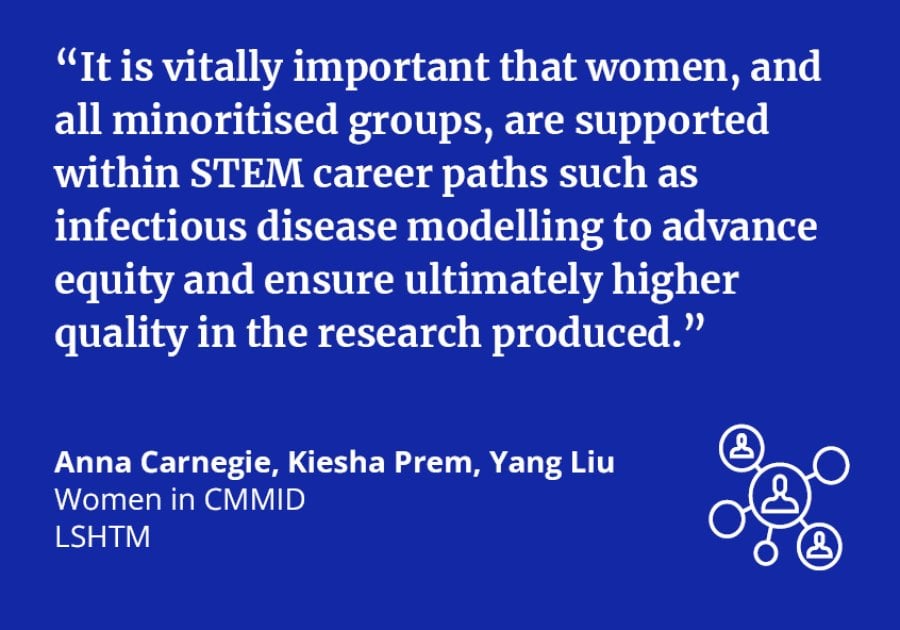
By Anna Carnegie, Yang Liu and Kiesha Prem
Women in CMMID or WinC, came into existence organically. From casual chats in the hallway, to themed meetings with invited speakers. The ways we interact have evolved - but our collective goal has not. As a group, we hope to support each other, and other cis and Trans women and non-binary people who work in the space of infectious disease modelling. We aim to support one another to progress professionally in a STEM (science, technology, engineering, and mathematics) field where our voices are often not heard as vocally those of our (cis male) peers. In 2023, we received support from the Bill & Melinda Gates Foundation (BMGF) to further our efforts in capacity building and career development.
Why is an initiative like this still needed?
The gender bias in academia has been well documented, with women less likely to have scientific papers published or to secure research funding. In the field of infectious disease modelling for global health, women are systemically underrepresented, particularly in the higher levels of academia. This means our voices are often lacking from research decision-making as well as in the interpretation and analysis of results and any subsequent recommendations for policy and practice. This has an undeniable impact on the diversity and quality of the research produced. For instance, there is limited knowledge about how the impact of infectious diseases vary by gender. Published research and data on this topic has been made live in the anecdotal conversations held and challenges identified repeatedly by members of the women in infectious disease modelling community.
The BMGF funded grant to support “Women in Modelling at LSHTM” will enable us to gain a deeper understanding of the barriers that exist for women in infectious disease mathematical modelling so that we can work to address them. We will engage in qualitative research with members of the community and encourage everyone who is interested in participating, to subscribe to our email list. We recognise the importance of involving allies in the conversation, so will also reach out to men working in the infectious disease modelling field as part of this work.
We must not forget that the problems faced by all women are compounded for racially minoritised, LGBT+ women, disabled women, as well as women from lower-socioeconomic backgrounds and those with caring responsibilities. Intersectionality is a crucial consideration within this grant and the wider activities of WinC. We will ensure that the voices of women who experience overlapping forms of disadvantage are heard within our research.
It is vitally important that women, and all minoritised groups, are supported within STEM career paths such as infectious disease modelling to ensure that there is diversity in the research produced. This grant will support work which to date has been done on a voluntary basis, and often behind the scenes, by WinC members. In so doing, it will help redress the widespread issue of ‘invisible’ labour within academia, which often falls on women and other minoritised groups.
What we have planned
We will be hosting our first “scientist-in-residence” in mid-March. Prof. Juliet Pulliam, the director of the DSI-NRF Centre of Excellence in Epidemiology Modelling and Analysis (SACEMA, South Africa) will be visiting our group and interacting with our members through a series of seminars, research discussions, networking events, and one-on-one mentoring opportunities. We will also be organising additional capacity building activities focusing on the key training needs identified by WinC members. If you work in infectious disease modelling and at LSHTM, we encourage you to join the community of CMMID and WinC. To keep up with the opportunities opened to women working in infectious disease modelling outside of LSHTM, please join our external mailing list.
If you enjoyed this article and would like to build a career in global health, we offer a range of MSc programmes covering health and data, infectious and tropical diseases, population health, and public health and policy.
Available on campus or online, including flexible study that works around your work and home life, be part of a global community at the UK's no.1 public health university.
